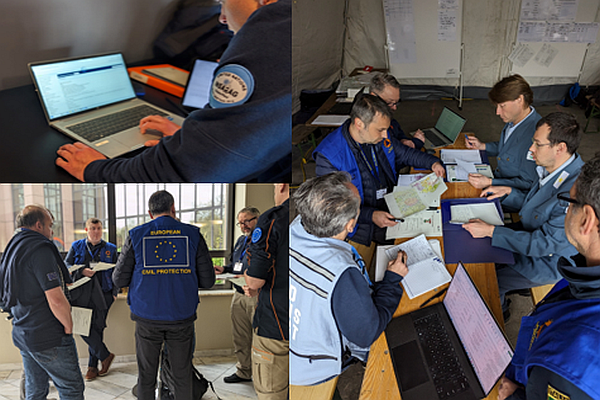Disaster management must be trained so that aid arrives efficiently in the event of a crisis – also in international disaster management. In addition to field exercises in which technical equipment such as pumps are used, tabletop exercises are primarily used to train coordination between the actors.From 24 to 27 June 2023, a Module Table Top Exercise (ModTTX) was conducted in Ratingen under the auspices of the Federal Agency for Technical Relief (THW). Dr Benni Thiebes (DKKV) was present at this exercise as an evaluator and was thus able to take a look behind the scenes of such an exercise. This exercise was particularly about communication and coordination between different modules used in the EU Civil Protection Mechanism (EUCPM). A key actor between the modules is the EUCP team, which was composed of representatives from the ERCC (Emergency Response Coordination Centre of the European Commission), TAST (Technical Assistance Support Team) and UNDAC (United Nations Disaster Assessment and Coordination).The participating modules came from eight countries (Belgium, Finland, Croatia, the Netherlands, Poland, Slovenia, Spain, Hungary) and included capacities for water pumping, water treatment, search and rescue, water rescue with boats and emergency medicine including a field hospital.The scenario played out dealt with heavy rainfall that led to large-scale river flooding, especially in the Bonn, Cologne and Aachen region. In addition, a strong earthquake occurred in the scenario, which caused massive infrastructure damage in the region.In order to have more freedom in designing the scenario and to prepare the participants for operations in non-EU countries, the country New Republic of Westland (NRW) was invented for the exercise, which is spatially identical to the German federal state with the same abbreviation. A big advantage over a fully simulated area is that existing information, e.g. from Google Maps, can be used.The table-top exercises involve a lot of role-playing. A total of 24 role-players were involved, including staff from the Ministry of the Interior of North Rhine-Westphalia and the fire brigades of Cologne, Bonn and Ratingen. In addition, there were 5 trainers and 4 certifiers as well as 14 people in the simulation management EXCON (Exercice Control).The exercise started with a video showing the effects of the flood and the earthquake. After the activation of the EUCPM and the deployment of the modules, airport procedures (immigration, customs) were first simulated and then discussed.The coordinating OSOCC (On-Site Operations Coordination Centre) was then moved to the THW local association in Ratingen – in the simulation, this was based at the Bonn Fire Brigade. The modules moved into their BoO (Base of Operations) spatially separate from the OSOCC, as this was set up in Brühl in the scenario.
Communication between the EUCPT and the modules, as well as among the modules themselves, was primarily carried out via a virtual OSOCC (vOSOCC) and via Microsoft Teams. This enabled the simulation management to monitor the communication and support it with hints in follow-up discussions.
An important element of table top exercises are “injects”; here, certain, usually previously determined events are built into the simulation process – without the participants and trainers knowing about it. An inject can affect the actual situation or be a visit by a VIP announced at short notice. In the scenario played, for example, the participants were visited by an EU ambassador and the Minister of the Interior of the New Republic of Westland or had to face an interview with an international media representative.
The Table Top Exercise proved to be a very good tool to practice communication and coordination processes, not only between the EUCPT and the modules. This resulted in close cooperation between different modules: for example, one module with high capacity water pumps provided the water for treatment by another team.
The whole exercise clearly underlined the importance of international cooperation in civil protection and the overriding role of coordination and communication. Such exercises are essential to train for emergencies and to ensure the efficiency of the EU Civil Protection Mechanism.


